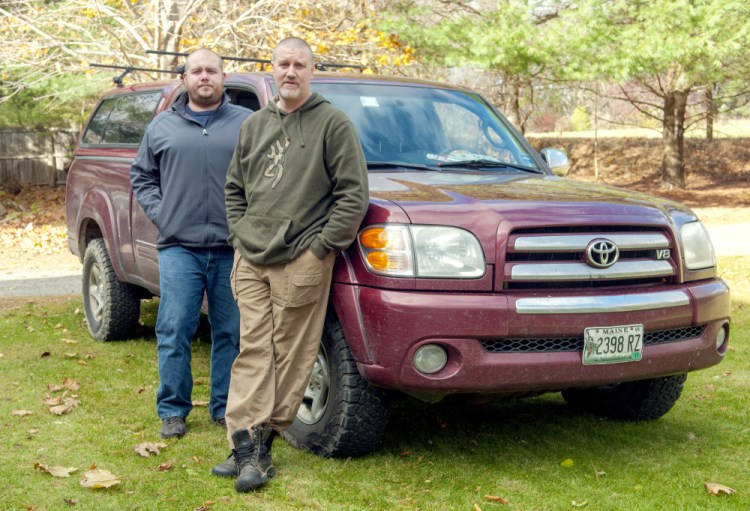Ron Greco and Tom Robinson were driving north on Route 201 in Somerset County to go bird hunting a few weeks ago when they came across a truck stopped in the middle of the road near Parlin Pond.
The cousins pulled over and Robinson, of Litchfield, got out and walked up to the truck. He opened the door and shook the driver but didn’t get a response. Greco called 911. They checked the man’s pulse and he started to wake up from his half-conscious state.
Between the time they called 911 around midnight on Oct. 26 and the time a U.S. border patrol agent responded to their call, the cousins followed what they believed to be a drunken driver, observing him swerve all over the road, staying on the phone with police dispatchers and at one point pulling him over and offering to drive him home.
The cousins believed the man was drunk – they said he stank of alcohol – and were worried about the likelihood of a deadly crash, so they were surprised when they learned from the Somerset County Sheriff’s Office a day later that he wouldn’t face criminal charges.
“I’m sick to my stomach about this because this guy is going to kill somebody,” said Greco, 42, of Cumberland.
Yet the sheriff’s office and Somerset County District Attorney’s Office stood by the decision to not press charges, saying there wasn’t enough evidence in the case to move forward, and a Portland attorney specializing in OUI backed up that claim, saying it would have been hard to prosecute.
But the incident also raises questions about the challenges law enforcement faces in rural areas such as northern Somerset County, where officers are spread thin.
After the first encounter with the man near Parlin Pond, Greco and Robinson kept following him. The cousins offered to drive the man home again, but he refused, according to Greco, who said he also noticed the man had several firearms in his truck. They stayed on the phone with dispatch and kept talking with the driver, hoping an officer would arrive soon, when the driver started to get angry with them and asked them to leave.
“He said, ‘Well, I’m going to go the other way,’ because he clearly didn’t want us to follow him anymore, so I backed up and let him pull out,” Greco said.
The cousins were on the phone trying to contact dispatch again, after their call was dropped, when a border patrol agent appeared. The dispatcher told the cousins that border patrol would supervise the man until the sheriff’s deputy arrived, and they left.
After they touched base with the sheriff’s office the next day, a corporal told them no statement was needed.
Somerset County Sheriff Dale Lancaster said the driver’s story – that he had consumed the beers after parking his truck and not before or while driving – presented a problem to law enforcement. He said they couldn’t prove the man hadn’t been drinking while parked.
The deputy who responded, Ian Shalit, tried to talk with Greco and Robinson that night, but owing to poor cellphone service, couldn’t get in touch with them. The men also said they didn’t get the call until the next day.
According to Somerset County District Attorney Maeghan Maloney, the officer couldn’t conduct a blood-alcohol test without probable cause, and without speaking to witnesses he wasn’t sure how true the man’s story was. After calling an assistant district attorney in the middle of the night to consult with him on the case, Shalit had the man’s car towed and drove him home.
Matthew Nichols, a Portland attorney specializing in criminal defense and OUI, said there are a “number of problems” with the case that would have made it hard to prosecute, including the inability to collect witness statements.
Nichols also said he was also concerned about the possibility that border patrol had unlawfully detained the driver.
Greco described the case as a “clear hand-off” from him and his cousin to border patrol, via dispatch, and said he didn’t understand why the officer would have questions about the time frame. But Nichols said that without witness statements from the two men, the deputy couldn’t rely on what the dispatcher had told him.
“It’s not admissible in court,” he said. “The deputy can’t go into court and say, ‘Here’s what dispatch told me these two guys told her.’ It’s hearsay.”
And while Greco and Robinson could have made statements to Maloney’s office after the fact, Nichols said the case was still problematic. A blood-alcohol test is not needed to prove OUI in Maine, but without one it is difficult, he said.
Furthermore, there are questions about whether border patrol had the right to detain the driver for nearly an hour before the deputy arrived, he said.
Border patrol agents generally cannot make arrests for OUI – as a federal agency they are not charged with enforcing state laws – but Lancaster said the sheriff’s office does rely on them from time to time for help responding to situations and “they can assist another law enforcement agency.”
Lancaster said Greco and Robinson have a valid concern but it doesn’t change the case. He said the sheriff’s office, though they didn’t have the evidence to bring up charges, did respond by towing the man’s car and driving him home.
“We know who he is, and if he continues with this type of behavior, I can assure you it might not be the same scenario next time we interact with him,” Lancaster said.
Rachel Ohm can be contacted at 612-2368 or at:
rohm@centralmaine.com
Twitter: rachel_ohm
Send questions/comments to the editors.




Comments are no longer available on this story